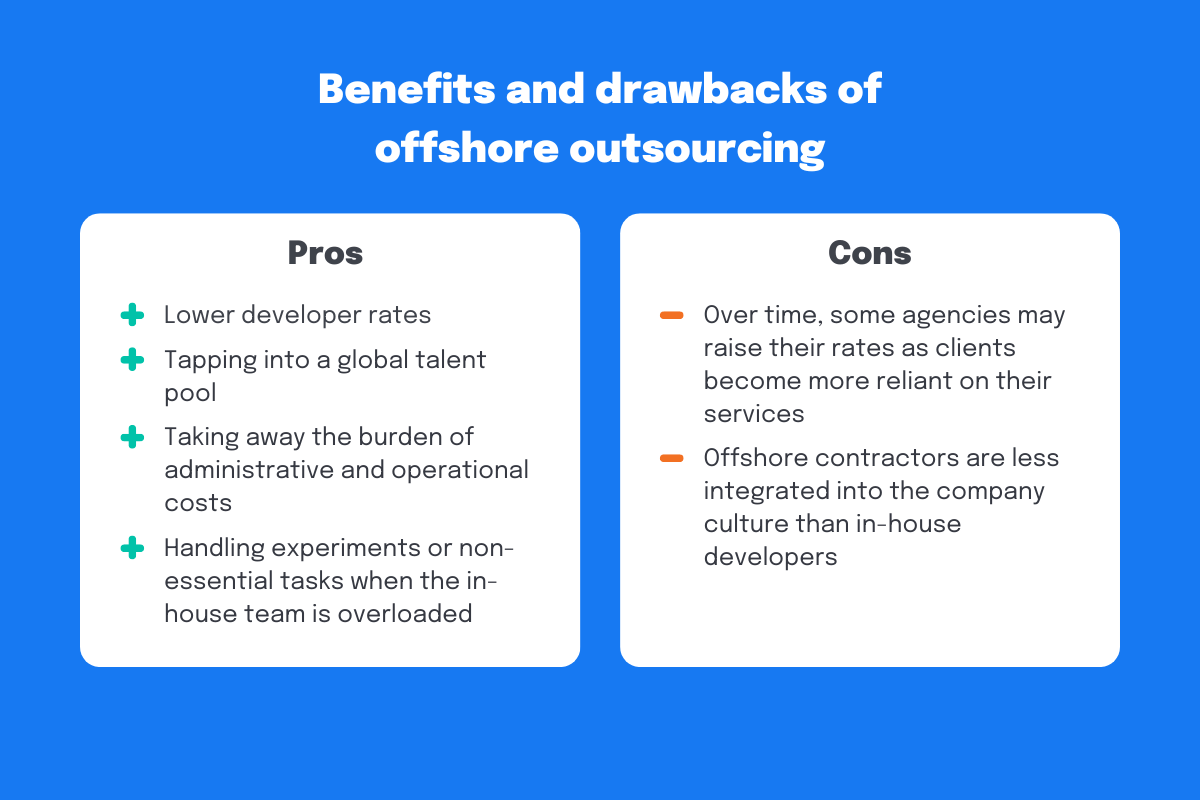After you’ve decided to hire offshore developers for your project, the first questions that you may ask yourself are, “Where to outsource?” and what are the advantages and pitfalls of offshore outsourcing. To have those questions answered, you have to thoroughly research different offshore destinations to find the one that fits you best. This article explains the nuances of offshoring and introduces you to the most popular locations for outsourcing your projects.
Table of Contents
What is offshore outsourcing?
Offshore outsourcing is a practice of transferring some planned or existing business activities to a company in a distant geographic location, particularly offshore destinations with lower labor costs such as Mexico, Colombia, Ukraine, and India. This initiative can involve a range of operations, from the entire IT function to its individual components, such as software development, quality testing, or modernization of legacy systems.
Offshore outsourcing helps increase business productivity and compete with other companies in the industry by leveraging a larger talent pool and access to niche skills. In addition, it simplifies the legal aspects of local hiring, reduces taxes in the customer’s country, and takes care of all the administrative and operational costs associated with employing a software development team.
Why do companies choose offshore outsourcing?
Before we jump to the most preferred countries, let’s understand the benefits outsourcing offers:
- Better exposure to an untapped global talent pool of well-educated and highly-trained professionals.
- You can go to any country and yet work according to your time zone, which means you can hire talent as per your requirement, experience, project, and time zone without any compromise on quality.
- Offshore outsourcing can lower your development and operation costs from anywhere, ranging from 30% to 60%.
- Offshore locations consider asset protection a priority and therefore offer higher risk management by partitioning the operations
- Cutting-edge technology and the constant evolution of innovative solutions are the lifelines of offshore teams. They have a lot of expertise in diverse industries and therefore work constantly to bring about the latest innovations to add more value to your idea.
Pros and cons of offshoring
Choosing the right approach depends on the company’s experience working with external providers. However, we have summarized the main advantages and pitfalls of offshore outsourcing:
Pros
- The main advantage of hiring offshore development teams is cost reduction. In addition to having lower developer rates in many offshore countries, outsourcing takes away the burden of administrative and operational costs, as well as investments in training and equipment. In other words, businesses hiring offshore developers don’t have to worry about retirement contributions, health insurance, vacations, office rent, or workstations as they do for in-house employees.
- When you choose offshore outsourcing, you are tapping into a global talent pool. The number of ready-to-work offshore developers with niche expertise or a unique skill set is much larger than the selection of local developers.
- Offshore development is an effective way to handle experiments or non-essential tasks and projects. When the in-house team is overloaded with work, the company doesn’t have the capacity to invest in a new project or reduce technical debt. That’s when offshore outsourcing comes in handy.
Cons
- Some agencies can increase the budget and reconsider their rates over time. Initially, they may cut prices drastically to get the client. Then, the longer you work with the agency, the more you depend on it, and the outsourcing provider can take advantage of this situation to raise prices. Because of how much you have already invested in them, it will be more expensive for you to replace them.
- Offshore contractors are less integrated into the company culture than in-house developers, and they typically communicate less with other teams. The key to solving this problem is good communication and the development of more detailed project guidelines that allow offshore contractors to be aware of and take into account internal processes and other company initiatives.
- Offshore contractors can juggle multiple projects. In fact, in-house software engineers can do it too. There were many reports of people working full-time for multiple companies, especially when the market was overheated in 2021. Switching between projects affects code quality, and the best way to notice these changes is to have professionals with a technical background on the team.
The best offshore destinations that you can consider for outsourcing software development
Poland. Located in Eastern Europe and one of the few outsourced destinations belonging to the European Union, Poland is quite an attractive country to build an offshore development team. Other advantages compared to other offshore locations are competitive rates (an average yearly salary of a software engineer in Poland is $62,135), a stable economy (as of 2023, Poland belongs to the top 10 European countries with the biggest GDP), similar cultural and business etiquette standards (for Europe-based companies), favorable tax conditions, and rapidly growing IT market (5-10% a year).
Romania. It is one more Eastern European country that you can choose as your preferred outsourcing destination. What you need to know about offshore software development in Romania is that it belongs to the top 5 EU countries with the fastest growth of the economy. Other benefits are relatively low costs (75% lower than Western and even Eastern Europe), little timezone difference with Europe due to convenient location, EU membership, and broad tech expertise with a wide scope of technologies.
Serbia. It is an Eastern European country that is a candidate for the EU since 2012. Among the main advantages of software development outsourcing to Serbia are an attractive climate for international cooperation (including foreign investments and significant tax-saving provisions for IT outsourcing companies), minimal timezone difference with Western European countries, and a high professional level of employees from Serbia (starting from the high level of development skills and English fluency and finishing with a similar working culture).
Ukraine. Ukraine is also located in Eastern Europe. It’s pretty easy to reach most of the European capitals from Kyiv, the country’s capital. Moreover, Ukrainians can travel to the EU without a visa, which is quite convenient for European clients who’d like to invite their team members to the head office. Although the mobility of men is limited at the moment, many Ukrainian IT companies could offer their employees the opportunity to travel abroad on a temporary basis. Ukraine is the world’s third country by the number of certified IT specialists. At the same time, the rates are pretty affordable, starting at $27 per hour. Like Polish developers, Ukrainians have business etiquette standards close to Western Europe and the United States. Therefore, Ukraine is also a pretty good place to build an offshore development team.
If you want to check your potential Ukrainian software contractor’s background, you can get a full compliance investigation by requesting an audit through Contractor Intelligence.
Moldova. Moldova is a less typical choice for software development outsourcing simply because Ukraine and Poland outnumber this small Eastern European country in terms of tech talent. But Moldova’s IT sector shows constant growth from year to year. Moldovans are strong in web development, especially in Java, PHP, and Python.
Bulgaria. Enormous companies like IBM, Microsoft, and Paysafe expanded to Bulgaria over the past years, making the country one of the most attractive outsourcing destinations in Eastern Europe. With over 5000 graduates in ICT per year, Bulgaria can offer a wide range of skilled experience developers in Python, Java, JavaScript, PHP, or Node.js. The Bulgarian government continuously invests in IT hubs and Tech park development all over the country, building a strong IT community.
Hungary. It is another country in Eastern Europe with over 80,100 tech professionals to offer. If you are looking for web or mobile app development, Hungary is the right choice to hire dedicated developers. They are skilled in JavaScript, HTML/CSS, Python, Java, PHP, SQL, and React.js. The country has a low attrition rate that guarantees developers stick to your project until the end. However, there are not many options to choose from while selecting IT hubs, as most of the talent concentrates in Budapest.
The Czech Republic. More than 180,000 IT specialists have a vast talent pool in the Czech Republic. It brought the attention of prominent companies like Oracle and Microsoft. Most coders are strong in Java, PHP, C, C++, C#, Python, Ruby on Rails, and Swift. Outsourcing software development to the Czech Republic is a preferable choice as companies may find talent for front-end, back-end, hybrid or mobile app development, or full-stack development.
India. It is probably the most popular offshore destination. The population of India is currently 1,408 billion people, among which are 5.2 million software developers. This number is both an advantage and disadvantage: a vast talent pool to choose from vs. challenges related to finding the right talent in India. The Indian offshore development market is quite diverse, with numerous local freelance platforms you can use to hire developers. The main benefit of hiring tech talent in this country is low costs. However, this can often mean low quality. A more reliable option would be to collaborate with outsourcing companies instead of looking for developers at freelance websites.
Latin America. Over the past decade, Latin American countries have grown their reputation in the IT domain and become one of the top destinations for offshore software development. Companies choose countries such as Argentina, Colombia, Chile, Brazil, Uruguay, Costa Rica, and Mexico, among other offshore destinations, because of little timezone difference with the US, English language proficiency, and solid educational foundation. For example, here are the 6 reasons for outsourcing software development to Mexico. US-based startups prefer to hire developers from the Latin America region, as they can speak Spanish among themselves, which lowers the risks of miscommunication and makes the process faster. At the same time, it becomes difficult to choose the right candidate because of the large tech talent pool. Additionally, the software development costs are significantly higher than in other destinations–starting from $47 per hour; however, the company can be confident in developers’ skill level and still pay less than in the US for experienced senior developers. Other drawbacks are complicated tax policies, lack of discipline, and political instability in the region.
Vietnam. The country is well-known for its surprisingly low labor and product development cost–90% less than in the US. Vietnam offers a lot of well-educated and highly skilled talents in the field of software development at reasonably affordable prices. Moreover, the Vietnam government continuously supports technological growth and endorses foreign investment opportunities. Quality and cost-effectiveness do make a deadly combination of the most appealing offshore outsourcing destinations in the world. Many tech powerhouses, like Microsoft, IBM, etc., have outsourced their projects to Vietnamese service providers.
The Philippines. With a 95.8% literacy rate, a 46% growth rate, and over 92% of the English-speaking population, the Philippines is one of the leading countries in the outsourcing landscape in Asia and worldwide. Its low labor costs stand out as one of the most attractive IT services hubs amidst the financial breakdown post-pandemic. The country’s efficient communication, language diversity, and highly proficient cost-effectiveness have made the Philippines one of the hottest spots for offshore services.
Malaysia. Greatly preferred for its IT services, Software development, and BPO offshoring services, Malaysia stands as an established player and one of the strong competitors for the top outsourcing countries in 2023. It has received a very high ranking from world-class companies. The country is cost-effective and is well-noted for its value-oriented assistance. It’s an excellent pick for mid-sized firms that are looking for high quality at a lower cost. Malaysia’s IT industry is highly vibrant because of its collaboration and partnership, which attracts businesses worldwide.
A checklist for hiring offshore developers
Before you select from the list above, we highly recommend you check off the essential points to make sure you are making the best decision. We have prepared the top seven points that we feel should be covered before you make a location choice for building your offshore development team.
- Developers skill-set: It’s an important one. Ensure that developers from the outsourcing company you choose have the right skill set to deliver a high-quality project.
- Reviews and Work History: You can also cross-check the quality of work through previous reviews from clients. It will give you more insight into the quality offered, company culture, work process, and much more.
- Language Barrier and Communication: Countries with a high English-speaking population, like India, the Philippines, and Ukraine, and countries with multi-lingual skills within your budget are the friendliest offshore locations. Selecting from such places will help you avoid any language barrier or miscommunication.
- Convenient time zones: This is another crucial determinant and a huge difference-maker. In a fast-paced business ecosystem, you cannot be waiting all day or for their time zone to get things moving.
- Affordable prices & Quality Work: Speaks much for itself. While a developer in the US earns over $80/hour on average, you can get the same work done in the same or better quality from the locations mentioned above at half of the price than in the US. It is a cost-effective decision indeed.
- Location and culture: Language is not the only barrier in offshore outsourcing. Sometimes, the culture clash can be a significant disadvantage. It is ideal to choose a site with similar or compatible cultures.
- Data & Asset Security: Last but not least, your project’s security and data are of utmost importance. Ensure that the location and company you choose are highly reliable and can be entrusted with confidential information. Check for their work history to see if any clients had any issues with a data leak.
Before you pick a location for outsourcing your business or software development, pay very close attention to your requirements first, compare the costs, infrastructure, cultural differences, time zone, and most importantly, the talent pool. Prepare your selection checklist and see which country ticks all the right boxes.
Browse 500+ Dev Teams Available for Hire
Conclusions
This blog has listed many well-known countries for providing cost-effective, high-quality services. However, this is not the end of the list. There are numerous countries out there that are best at offering niche services. Some are best for BPO, and some are best for providing software development services.
It’s up to you to choose where to outsource and which offshore location to choose. It depends on various factors, such as project scope, technology stack, time zone differences, business etiquette differences, and estimated development budget. We wish you good luck in choosing a perfect offshore destination and building your dream team.
Additional info: Top offshore countries to incorporate your business
Singapore. One of the most prominent locations for offshore incorporation, Singapore offers some captivating benefits to companies, such as globalization, high security, data privacy, intellectual property, and legal maturity, that have encouraged many businesses to outsource their services. Moreover, Singapore’s corporate tax rate price is meager, 17% to be exact, which is a major attraction that appeals to foreign corporations to set up their offshore company. The top talent is usually hard to find in Singapore, but it’s an excellent location to set up your offshore team.
Hong Kong. One of the most prominent and prestigious financial centers globally, Hong Kong is the freest economy globally, as rated by the Index of Economic Freedom for the 20th consecutive year. It has topped the Financial Development Index chart, leaving the United States and the United Kingdom behind. Hong Kong has a robust and transparent international business and regulatory environment, wide-ranging investment opportunities, an efficient banking system, solid corporate laws, a competitive tax system, and a low-income tax rate, making it one of the most desirable tax havens globally.
The Cayman Islands. Another country renowned as a major tax haven and offshore banking center is The Cayman Islands. Situated in the Caribbean Sea and British Overseas Territories, The Cayman Islands is an important and popular financial hub for offshore business services. It is recognized as the fourth largest international financial center globally due to its economic and political soundness and the attractiveness of tax-related advantages. The Cayman Islands is also home to numerous financial institutions like global banks, accounting firms, hedge funds, insurance companies, and investors. Moreover, according to the Financial Secrecy Index, The Cayman Islands is one of the safest asset protection locations.
Belize. This tiny but prominent Central American country is a first-rate choice for overseas and offshore businesses. Belize has an amazingly robust infrastructure, a high literacy rate, a highly educated workforce, and government support through attractive tax incentives.









